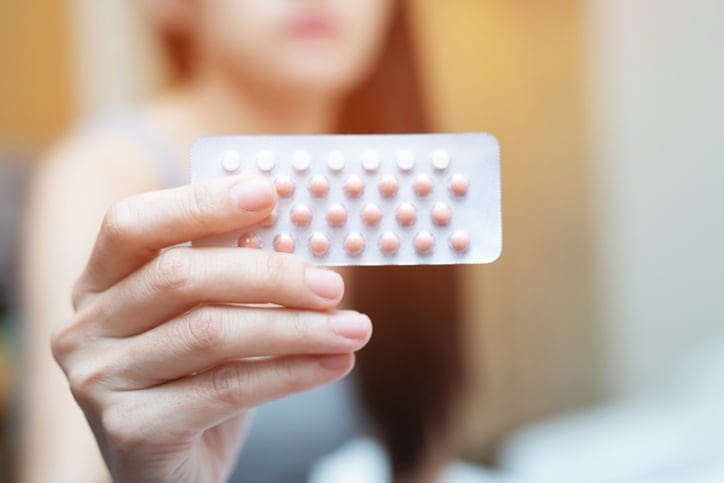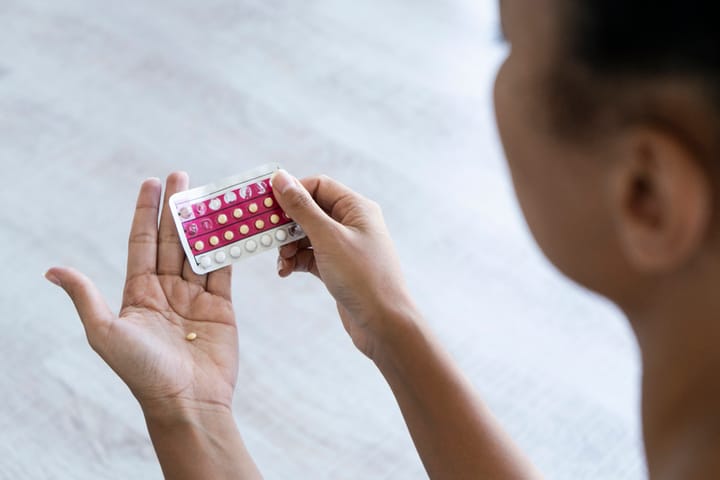If you’ve ever been planning a vacation and didn’t want to be bothered by your period arriving right in the middle of it (yeah, it’s a bummer), you might have delayed its arrival by using birth control. This is known as menstrual suppression. Generally, though, you might wonder if starting birth control will stop your period altogether. You should still get your period when you’re on birth control, but it’s not guaranteed, and it’s certainly not uncommon for women to experience some menstrual changes. Bear these points in mind when you’re choosing the best birth control based on your situation.
- How does the birth control pill affect your cycle? The birth control pill releases hormones into your system, such as progestin, estrogen, or both, depending on the type of pill you’re on. These pills can affect your period, which is why you might find you bleed less during your period or you miss some periods.
- What about continuous birth control pills? There are some types of birth control pills that are known as continuous pills. They contain progestin and estrogen. How they work is that you take all the active pills for three months, then you take the inactive pills for one week. When you do this, it’s not uncommon for your period to only appear four times a year on weeks when you’re taking the inactive pills.
- What about hormonal IUDs? If you’ve got an IUD in your uterus to prevent pregnancy, you might find that if you’re on a hormonal IUD instead of the non-hormonal variety, your periods can become lighter and shorter. One study found that around 23 percent of people with hormonal IUDs went for a period of 90 days or longer without a period within the first year after they’d had an IUD inserted by their doctors.
- Does the birth control ring stop your periods? If you continuously wear the birth control ring, you will skip periods. Doing this is regarded as a safe way to stop having your period, so you just have to remember to wear it all the time. But, you might get some spotting during this time.
- What about the patch? Usually, you remove the contraceptive patch for the fourth week of your menstrual cycle, and this is what causes your period to come. But, if you continue using the patch for the fourth week, this will delay or completely stop your period.
- What about the contraceptive injection? If you’re getting shots to prevent pregnancy, you might find that it makes your periods stop or become a lot lighter. This isn’t always the case for everyone who starts this birth control method and you can’t control if it happens to you. So, if you do find that your periods have stopped and it worries you, chat to your doctor about it.
More ways birth control can affect your period
- What are the risks of stopping your periods? If you like the idea of using contraception to make your period go MIA, you might wonder if this is completely safe. It is, but it’s not free of symptoms. One common symptom is spotting, which is when you bleed in the middle of your cycle. The good news is that you will experience much lighter bleeding than what you experience on your period.
- Beware of pregnancy signs when stopping your period! If you’re going to be skipping periods with the use of birth control, you should be aware that it can make it difficult to figure out if you’re pregnant. This is because not having periods anymore will mean you won’t be looking for a missed period as a red flag of pregnancy. You’ll have to ensure you stay alert for any other symptoms that signal you might be pregnant, such as nausea or breast tenderness. While some things can sabotage birth control, you don’t want birth control to make you miss those important pregnancy signs!
- There are other culprits for period-related changes. While we’ve talked about how stopping your period can be achieved (or it can happen accidentally) with birth control, it’s worth noting that there could be other reasons why your period has slowed down or stopped which have nothing to do with your birth control method. For example, stress and a lot of exercise can both do this, so make sure there’s not something else in your life that’s causing this to happen.
- Some birth control methods intensify your period. We’ve featured types of birth control that can slow down or stop your periods, but some do the opposite. Yikes. For example, although hormonal IUD can prevent your period, the non-hormonal IUD can do the opposite – it can make your bleeding heavier during your period, sometimes in both the short- and long-term.
- How long does it take birth control to stop your period? If you’re about to start taking birth control, you might wonder how long it will take for it to send your period packing. Generally, most hormonal methods of birth control can take a few months before they slow down or stop your period.
- When will your period come back after stopping birth control? If you want to stop taking birth control, you might wonder how long it will take for your period to return. This does require your body to begin producing hormones again on its own, but your menstrual cycle will usually goes back to normal within three months. However, the contraceptive shot can take between six and 18 months before it gets you back on track, so bear that in mind.




